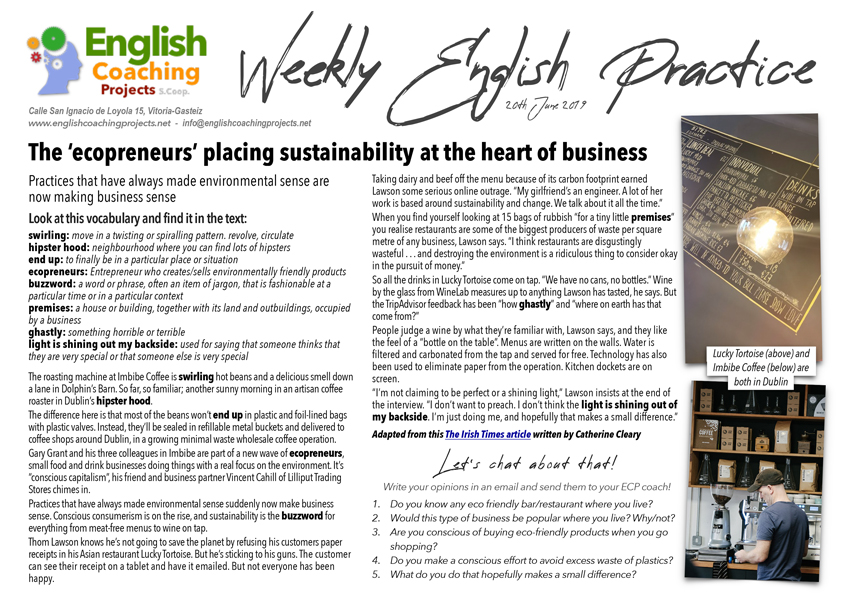In this week’s Weekly English Practice ECP coach Darren talks about the positive side of recycling and sustainability. Read the WEP to find out more about Dublin’s ecopreneurs!
Click on the image to download the pdf
Practices that have always made environmental sense are now making business sense
Look at this vocabulary and find it in the text:
swirling: move in a twisting or spiralling pattern. revolve, circulate
hipster hood: neighbourhood where you can find lots of hipsters
end up: to finally be in a particular place or situation
ecopreneurs: Entrepreneur who creates/sells environmentally friendly products
buzzword: a word or phrase, often an item of jargon, that is fashionable at a particular time or in a particular context
premises: a house or building, together with its land and outbuildings, occupied by a business
ghastly: something horrible or terrible
light is shining out my backside: used for saying that someone thinks that they are very special or that someone else is very special
Listen to the audio (refresh the page if it’s not visible)
The roasting machine at Imbibe Coffee is swirling hot beans and a delicious smell down a lane in Dolphin’s Barn. So far, so familiar; another sunny morning in an artisan coffee roaster in Dublin’s hipster hood.
The difference here is that most of the beans won’t end up in plastic and foil-lined bags with plastic valves. Instead, they’ll be sealed in refillable metal buckets and delivered to coffee shops around Dublin, in a growing minimal waste wholesale coffee operation.
Gary Grant and his three colleagues in Imbibe are part of a new wave of ecopreneurs, small food and drink businesses doing things with a real focus on the environment. It’s “conscious capitalism”, his friend and business partner Vincent Cahill of Lilliput Trading Stores chimes in.
Practices that have always made environmental sense suddenly now make business sense. Conscious consumerism is on the rise, and sustainability is the buzzword for everything from meat-free menus to wine on tap.
Thom Lawson knows he’s not going to save the planet by refusing his customers paper receipts in his Asian restaurant Lucky Tortoise. But he’s sticking to his guns. The customer can see their receipt on a tablet and have it emailed. But not everyone has been happy.
Taking dairy and beef off the menu because of its carbon footprint earned Lawson some serious online outrage. “My girlfriend’s an engineer. A lot of her work is based around sustainability and change. We talk about it all the time.”
When you find yourself looking at 15 bags of rubbish “for a tiny little premises” you realise restaurants are some of the biggest producers of waste per square metre of any business, Lawson says. “I think restaurants are disgustingly wasteful . . . and destroying the environment is a ridiculous thing to consider okay in the pursuit of money.”
So all the drinks in Lucky Tortoise come on tap. “We have no cans, no bottles.” Wine by the glass from WineLab measures up to anything Lawson has tasted, he says. But the TripAdvisor feedback has been “how ghastly” and “where on earth has that come from?”
People judge a wine by what they’re familiar with, Lawson says, and they like the feel of a “bottle on the table”. Menus are written on the walls. Water is filtered and carbonated from the tap and served for free. Technology has also been used to eliminate paper from the operation. Kitchen dockets are on screen.
“I’m not claiming to be perfect or a shining light,” Lawson insists at the end of the interview. “I don’t want to preach. I don’t think the light is shining out of my backside. I’m just doing me, and hopefully that makes a small difference.”
Adapted from this The Irish Times article written by Catherine Cleary
Let’s chat about that!
Write your opinions in an email and send them to your ECP coach!
- Do you know any eco friendly bar/restaurant where you live?
- Would this type of business be popular where you live? Why/not?
- Are you conscious of buying eco-friendly products when you go shopping?
- Do you make a conscious effort to avoid excess waste of plastics?
- What do you do that hopefully makes a small difference?


